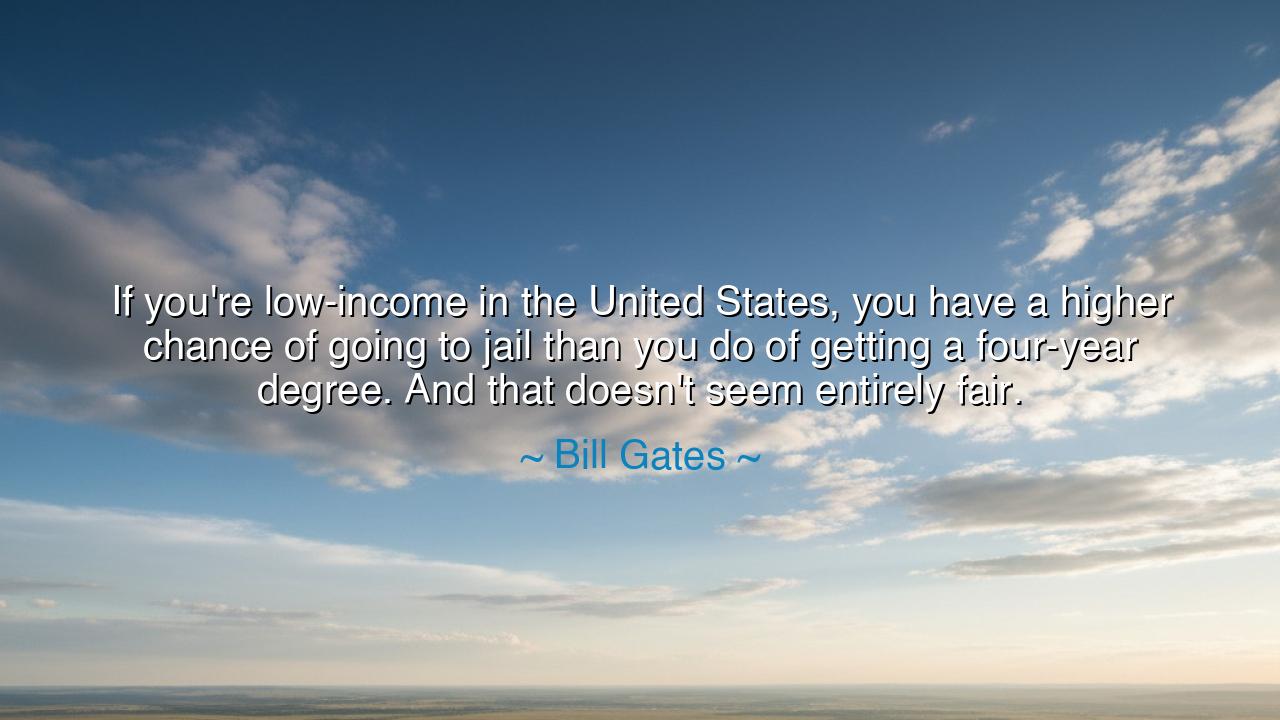
If you're low-income in the United States, you have a higher
If you're low-income in the United States, you have a higher chance of going to jail than you do of getting a four-year degree. And that doesn't seem entirely fair.






Hear now, O children of this land, where the dream of liberty and prosperity is promised to all, yet too often obscured by the dark shadows of inequality. There is a truth that calls to us from the depths of our society—a truth so uncomfortable, so bitter, that many turn their faces from it, pretending it does not exist. Bill Gates, a man known for his wisdom and his endeavors to uplift humanity, has spoken a harsh truth: "If you're low-income in the United States, you have a higher chance of going to jail than you do of getting a four-year degree." And as the ancient seers once said, we must listen to the words that challenge us, for they hold the key to our awakening.
The weight of this truth presses upon the hearts of the oppressed, for it speaks of an injustice that runs deep in the fabric of society. To be born into poverty in this land is to inherit not a promise of opportunity, but a battle for survival. It is as though the gates to success are shut, and the path to freedom lies through a prison of circumstance, not potential. The odds are stacked, not by the strength of the individual, but by the harshness of the system that shapes the individual’s fate before they are even born. This is the tragedy Gates speaks of—a land of opportunity that is, for many, a land of insurmountable barriers.
In ancient times, when warriors sought their place in the world, they knew that the struggles they faced were often a reflection of the world they fought within. The rich could afford the finest armor, the best training, and the protection of power, while the poor were left to fight with little more than their wits and courage. And though bravery alone may win a battle, it does not guarantee victory in a war that is stacked against you. Gates’ words remind us of this ancient truth: in the modern battle for success, some are armed with the tools they need to thrive, while others are left in the dust, the roadblocks of their birthright too great to overcome.
Consider the great empires of the past—how they rose and fell on the backs of those whose fates were sealed by forces beyond their control. Take, for example, the tragic story of the Roman plebeians, who struggled under the weight of poverty and oppression. Though they toiled tirelessly, their dreams of glory and success were often crushed beneath the power of the aristocracy. In a way, the low-income individuals in today’s world find themselves in a similar plight—those born into hardship are often condemned to walk a path that leads them not to enlightenment, but to the prison of society’s making.
But let us not despair, for even in the darkest of times, there are those who rise above the injustices of their age. One need look no further than the story of Frederick Douglass, born into slavery, with little hope of freedom or education. Yet, through sheer determination and the strength of his spirit, Douglass overcame the barriers set before him and became one of the most eloquent voices for justice and equality in the history of the United States. He did not accept the notion that his circumstances should define his future. His rise from adversity serves as a beacon for all those who face the injustices Gates speaks of.
Yet, Gates' words are not merely an observation; they are a call to action. For if this truth—that the poor have a greater chance of being imprisoned than of achieving a higher education—remains unchallenged, we are complicit in perpetuating this cycle of inequity. Change must come, not through the whispers of discontent, but through the loud voices and fierce efforts of those who dare to act. We must reshape the systems that have been so deeply ingrained, systems that deny the impoverished the right to a future of possibility. Education must not be a privilege of the wealthy, but a right for all, regardless of birth. Only then can we begin to heal the wounds of inequality.
To all who hear these words, I say this: do not wait for change to come to you, for change will not come of its own accord. Take up the mantle, seek knowledge, and demand justice. If you are of humble means, know that the road may be harder, but it is not closed to you. Just as the sun does not deny its warmth to the beggar as it does to the king, so too must we refuse to deny opportunity to those born in poverty. Seek out knowledge where it is found, whether in books or in the experience of those who came before you. Raise your voice against the injustices of this world, and demand that the gates of opportunity swing open for all who seek to pass through.
In conclusion, the words of Bill Gates hold a mirror to our society, reflecting not the best of us, but the truth of our failings. They call us not to despair, but to action—to fight for a world where every child, regardless of their station, can rise on the strength of their own merit, not be held down by the weight of their circumstances. Take this wisdom, and let it guide your path. Let the wisdom of the ancients remind you that greatness lies not in the circumstances of one's birth, but in the fire that burns within. Go forward and strive to make that fire burn ever brighter for all.






AAdministratorAdministrator
Welcome, honored guests. Please leave a comment, we will respond soon